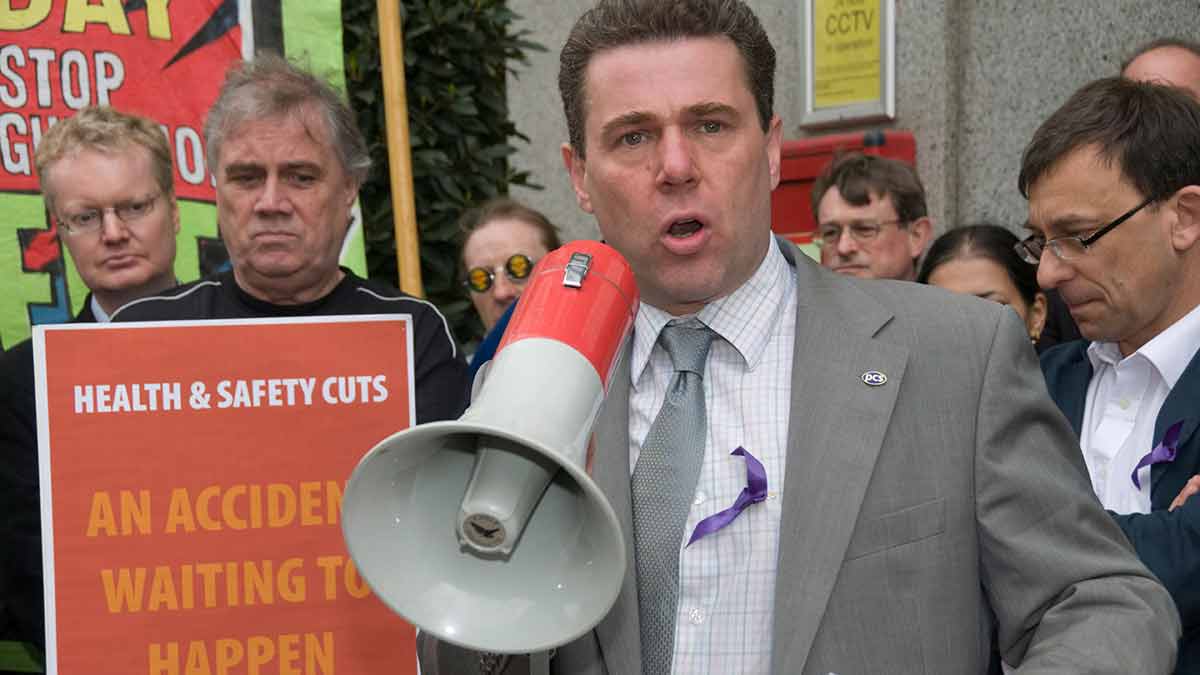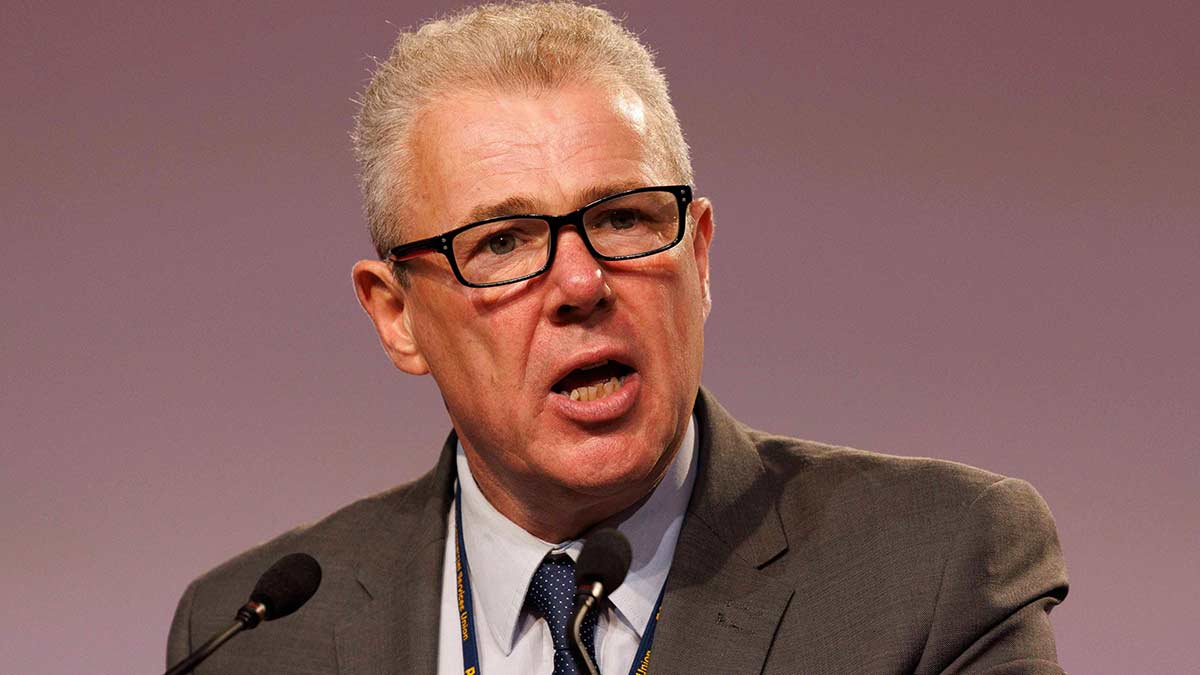Mark Serwotka retires after more than 20 years as general secretary of civil service union PCS next week. In an exclusive interview with Personnel Today, he discusses how the union landscape has changed, and what lies ahead.
During his tenure as general secretary of one of the UK’s biggest unions, Mark Serwotka has faced four life-saving operations, including a heart transplant in 2016, and was once told he had just days to live. “People were surprised when I came back after the heart transplant,” he says. “But one of my greatest personal achievements is to still be here.”
Serwotka retires from the Public and Commercial Services (PCS) union at the end of this month, having been re-elected to the top position four times and serving its civil service membership for almost 25 years.
It’s entirely politically motivated – it’s not driven by a drop in productivity. It’s ludicrous that the government says we’re lazy sitting at home”
The past two years have been among the busiest for PCS, with the union attracting record ballot turnouts in favour of strike action. In June, alongside fellow public sector unions FDA and Prospect, it secured a new pay offer including a £1,500 one-off payment for civil servants.
Negotiations continue over pay, pensions, threats to job security and redundancy terms, however, and members at individual government departments are taking or plan to take further strike action.
Playing politics
Arguments over pay aside, civil servants have also been at the sharp end of ministers’ ire in recent months. They have repeatedly been referred to as the “blob” by senior ministers, been described as “bone idle” for wanting hybrid working arrangements, and last year were issued with an immediate cap on headcount.
The union’s membership has swelled by 20,000 in the past two years, thanks to solid and visible campaigning and growing anger among civil servants that their pay is failing to keep up with inflation.
“This is testament to the fact that if people see unions doing something, that they’re serious about it, they want to join,” Serwotka says. “The issue going forward is whether we’ll retain those members when there’s no industrial action.”
Civil service unrest
Union membership in the UK overall is still relatively low, despite the impression given by ongoing industrial unrest, he points out. “When I left school it was around 13 million and now it’s 6 million. During the New Labour government we reached 300,000 at PCS, and today we’re at 190,000.”
Crisis point
PCS hit a crisis point in 2015 when civil service chief Francis Maude banned union members across a number of government departments from having their union dues deducted from their wages – known as check-off – which at the time was the source of 90% of the union’s income. Trade union representatives’ facility time, where they can liaise with staff and drum up new members, was also drastically reduced.
The policy was dropped in 2016, but PCS membership had dropped by tens of thousands in the interim. It successfully challenged the Department for Work and Pensions for ending check-off without employees’ consent, and secured High Court victories against several other departments.
“When I look back, we faced being out of existence, we faced bankruptcy,” he adds, “but fast forward to now and I look at a union that survived an almighty assault. We are now pretty independent of our employers, there’s very little check-off at all, and we have money in the bank. And for the first time in my memory as a civil servant, we’ve forced the government through industrial action to put more money on the table.”
Legal battles
One of the defining characteristics of PCS under Serwotka’s stewardship has been boldness in taking legal action like this against the government, and often winning.
In 2022, PCS launched legal action alongside human rights groups to put a halt to the government’s plans to deport asylum seekers to Rwanda, on the basis it is unconstitutional and could see members asked to act illegally.
When I look back, we faced being out of existence, we faced bankruptcy, but now I look at a union that survived an almighty assault.
The controversial Bill was voted through the Commons this week but is yet to be passed in the House of Lords.
The hurdles the legislation has met so far are “very much down to us as a union”, according to Serwotka, who says he is “immensely proud” of the role PCS played.
Another legal victory came in 2017, when PCS successfully challenged a controversial cut to redundancy payments and changes to pensions through a judicial review, which ruled them unlawful. (More recently the government has re-consulted on this as part of its cost-cutting measures; another key issue prompting members to strike).
From cradle to grave
The landscape has certainly changed since Serwotka joined the civil service at 16 when he lived with his mother. “She told me it would be a job for life, with a great pension, and that people would look up to me. The joke goes that she lied to me three times over,” he says.
Joking aside, he believes the civil service he joined as a teenager is very different from the one we have now. “There was a far more paternalistic attitude and it wasn’t all target-driven. When I worked for the DWP, our job was to ensure that people got what they were entitled to. Now they’re trying to reduce footfall to [job centres] and send people to call centres,” he adds.
Clearing out his office in preparation for his retirement, he found a campaign poster from 2003 when the union staged its first national strike. It depicts a pensioner and a newborn baby, with the slogan “From the cradle to the grave, you need a civil servant”.
This understanding that without the civil service, you might not be able to order a passport or access benefits, has been lost, he argues: “We do a lot of front-facing work that if we weren’t there, people would notice. We deliver some of the most important services, but we are some of the most underappreciated and undervalued people in the public sector.”

Mark Serwotka outside the Health & Safety Executive offices in 2008. Photo: Peter Marshall/Alamy
Broader remit
As is the case for most unions, industrial action and campaigning extends beyond wages and contract terms. “Pay and conditions will always be top of the list,” says Serwotka, “but increasingly we’re looking at equality, diversity and inclusion, career development and pressure at work. People want the ability to be treated with dignity, so all of these things are high up on their agendas.”
A good example of this is PCS’ response to Whitehall’s recent calls for civil servants to return to the office for at least 60% of the working week.
Hybrid working
2024 HR trends: ‘Hybrid work backlash could damage companies’
‘It’s not fair’: How HR can tackle hybrid working complaints
Late last year, the Cabinet Office reportedly sent departments a letter urging them to show “strong visible leadership” by attending the office three out of five days, claiming it would make them more effective and innovative.
“This idea is entirely politically motivated – it’s not driven by a drop in productivity,” says Serwotka. “It’s ludicrous that the government says we’re lazy sitting at home.” A PCS survey of members on the topic attracted the second-highest response of any it has run, he adds.
With reps’ facility time cut to the bone, campaigning on broader issues could be a means to sustain existing membership and bring new blood into the union, particularly as joining one isn’t front of mind for the generation now entering the workforce. “When I started work I asked to join the union on the first day, but now many aren’t asked. Nothing replaces a voice in the workplace.”
‘HR wants to help’
Serwotka has sympathy for HR leaders in the public sector, most of whom want to use their discretion but feel compelled to work to manuals and targets. “There’s an idea that if you go to HR you must be in trouble,” he adds. “And that’s not always the story. HR wants to try to help people but this gets lost in managing downsizing and restructures.”
Compare this to the private sector, he continues, where many larger companies have embraced hybrid working and there is a greater sense of trust and autonomy. “People see a well-remunerated workforce that feels its values and is more productive [in the private sector], but too often in the public sector we’re bearing the brunt of cuts and HR is overseeing something negative.”

Speaking at the TUC congress in Liverpool, 2023. Photo: Karl Black/Alamy
Will this change if we see a new government? Serwotka predicts the first thing a Labour prime minister would do is repeal the controversial minimum service levels regulations, which allow certain public service employers to maintain a certain level of operation during strikes. He also believes the “hostile attitude towards unions” of the current administration will shift for the better.
HR wants to try to help people but this gets lost in managing downsizing and restructures.
“But I also don’t think Labour will be as bold or as radical as we would like,” he adds. “We’ll still see problems with pay and resources, so the need for unions to challenge will not go away. If they do want to make a difference, they’d recognise that treating the pool of civil servants they have properly could be transformational.”
In December, it was announced that Fran Heathcote would take over the reins at PCS – its first female general secretary, something Serwotka feels will feel hugely positive to the union’s overwhelmingly female membership. He has three key pieces of advice for her when she takes over next month.
“I’d say, be yourself and run the union in your own image. Be bold but remember that you can only do things if you take people with you,” he says. “Finally, a leader is only as good as the team around them. Every achievement we’ve made is the achievement of the collective. They are the bedrock that allows you to be bold and be yourself.”
One thing is certain – with industrial unrest and wage pressures set to continue well into 2024, she’ll have a full agenda. Meanwhile, after more than 20 years serving his fellow civil servants, Serwotka is due a well-earned rest.
Sign up to our weekly round-up of HR news and guidance
Receive the Personnel Today Direct e-newsletter every Wednesday
Employee relations opportunities on Personnel Today
Browse more Employee Relations jobs
